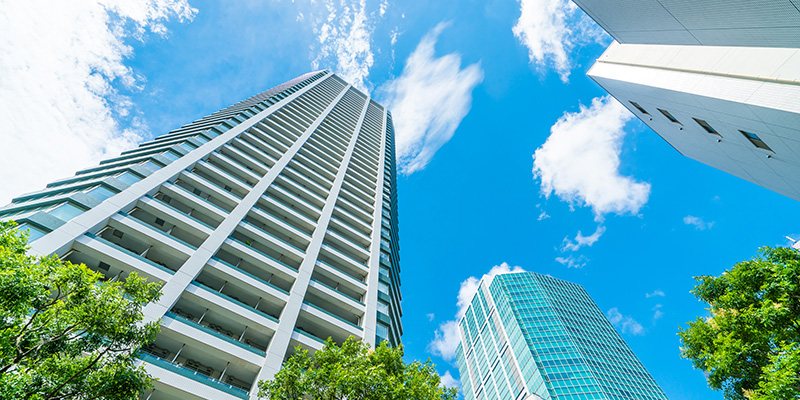Everything You Should Know About Condo Maintenance

As anybody who’s ever had his air conditioner go out in the middle of summer can tell you, buildings don’t maintain themselves. This is where condo maintenance comes in.
Browse By Category
Sign up for Our Newsletter
As anybody who’s ever had his air conditioner go out in the middle of summer can tell you, buildings don’t maintain themselves. This is where condo maintenance comes in.
Who Is Responsible for Condo Maintenance?
A common misconception about living in a condo building with a condo owners association (COA) is that owners need not take care of their units’ maintenance needs. While it is true that you might need to join a COA when you purchase a condo unit, it does not necessarily mean you have nothing to worry about anymore maintenance-wise.
Who is responsible for maintenance in a condo? A condo owners association is typically only responsible for the maintenance and repair of common spaces. That usually includes trash removal, snow removal, landscaping, and exterior maintenance. As for your own condo unit or “separate interest,” you will likely need to maintain it yourself.
When an association fails to maintain common areas, it can lead to possible legal trouble. Of course, every association’s policies are different. It is worth checking your association’s governing documents, specifically the CC&Rs, to see which maintenance responsibilities fall under the scope of the COA.
Generally, though, the association covers the maintenance of common areas, while individual owners cover the maintenance of their units and exclusive-use common areas. For those who are unaware, exclusive-use common areas are spaces shared by two or more owners but not all. This includes balconies, patios, porches, and so on.
The association should also perform inspections with the help of a condo maintenance checklist. This checklist must include all the areas the COA is responsible for. It is equally imperative for the association to stick to a condo maintenance schedule for regular inspections as well as preventive maintenance. In doing so, the COA can identify problem areas early on while simultaneously minimizing wear and tear.
Who Is Responsible for Plumbing in a Condo?
Plumbing is often a tricky subject. When a pipe breaks or water leaks, it can be hard to determine if the association or the individual unit owner should be responsible. Typically, though, any plumbing within the unit should be the responsibility of the owner, while those in public spaces should be the responsibility of the association. Owners should also cover plumbing immediately surrounding their units.
Who Pays for Roof Repairs in a Condo?
The assignment of condo repairs responsibility depends on what your governing documents say. Some associations require individual owners to cover the cost of repairs for roofs above their units, while other associations shoulder the responsibility for maintaining and repairing the entire building’s roof.
There are also associations with governing documents stating that whoever caused the damage should be responsible for condominium repairs. For instance, if a guest causes damage, that guest — be it an owner’s guest or a vendor-affiliated guest — should cover the cost of repairs. This condo repair rule usually applies to the common areas of a condominium building.
If the damage to a common area comes as a result of general wear and tear, the condo association will usually shoulder the cost. This is where insurance plays a critical role. Associations should have comprehensive insurance policies with different types of coverage. This includes coverage for natural disasters or damages that an owner did not cause.
Sometimes, the COA’s insurance provider will conclude that the damage was the owner’s fault. Therefore, they may refuse to cover the cost of repairs. When this happens, the association can fight its provider with the help of an attorney.
What Is Included in Maintenance Fees Condos?
A condominium maintenance fee, also known as simply condo fees or HOA fees, are regular fees that condo owners must pay to the association. The condo maintenance fee covers the cost of maintenance and upkeep of common areas in a condo building.
Typical maintenance and repairs services included in condo fees are landscaping, groundskeeping, snow removal, trash collection, exterior wall repair and maintenance, roof repair and maintenance, and the like. Condo fees also pay for the maintenance and repairs of amenities (if any), such as swimming pools, gyms, and parking areas.
Some condo associations include the cost of utilities in the monthly fees as well. Fees also usually cover insurance for the association but not for individual unit owners. Therefore, owners must still purchase their own homeowner’s insurance policies.
How Are Condo Maintenance Fees Calculated?
The maintenance fee condo associations charge does not necessarily remain the same throughout multiple years. These fees can change from year to year depending on the shifting needs of the association.
To calculate condo fees, the COA board first prepares an annual budget. They take all projected expenses into account, including maintenance and repair costs, utilities, payroll, property taxes, and insurance. Associations also need to maintain a reserve fund, which is essentially a savings account for major replacements and repairs.
Adding all these expenses as well as reserve fund contributions, the board then divides the total by the number of unit owners in the association. Some associations divide the amount equally, while others rely on a percentage breakdown of shares. Your governing documents should state the calculation procedure clearly in writing.
Can Condo Association Raise the Maintenance Fees?
 Condo associations do have the power to increase the maintenance fees that owners must pay. State laws and your governing documents might have a say on how much a COA board can raise the fees.
Condo associations do have the power to increase the maintenance fees that owners must pay. State laws and your governing documents might have a say on how much a COA board can raise the fees.
For instance, California Civil Code Section 5605 states that associations may not raise fees by more than 20 percent of the preceding year’s fees without obtaining approval from a majority of the members. A similar law appears in Arizona’s Revised Statutes.
A number of factors can affect the association’s need to increase the fees. Climbing inflation and wage rates, for one, can have a direct impact on the price of vendor services. Utility costs and rising insurance premiums can also influence condo fees.
As a condo owner, you might feel alarmed and even aggrieved due to the higher fees. But, you must keep in mind that the association is only doing its job of maintaining the condo building. An increase in projected expenses will naturally lead to an increase in fees.
Plus, it is not like the COA is profiting from your fees and neither is the board receiving a salary for fulfilling their duties. Board positions are, after all, filled by volunteer members. If you feel that the increase is unjustified or unreasonable, you can bring up the issue at the next meeting or talk directly to your COA board.
Do Condo Maintenance Fees Cover Insurance?
In a word, yes. Condo maintenance fees do cover insurance, but it is usually only for the association. Some policies may cover hazards typically covered by homeowners insurance. Such policies, though, are usually not as comprehensive as homeowners insurance, so individual owners should still purchase their own.
Does condo insurance cover water leaks? Most condo insurance policies do cover water damage as a result of burst pipes, ice dams, and even rain. It may also cover damages inside the unit resulting from water leaking from common areas.
Standard condo insurance may not cover flooding, though, if the water came from the ground up. You will usually need to purchase a separate flood insurance policy for this type of water damage. The same goes for water leaks and damage that come from a neighbor’s unit.
Not all policies have the same type of coverage, though, so it is best to request a copy of your association’s master policy as well as your own insurance policy.
What Happens If You Don’t Pay Maintenance Fees Condo?
You might feel discouraged from paying your condo fees because of how expensive they can be. But, you must remember that you agreed to abide by the association’s governing documents when you first purchased your unit. And, part of following those rules is diligently paying your dues.
If an owner refuses to pay their maintenance fees, then the COA board will need to recoup that loss from a different source. Often, that means imposing special assessments.
Additionally, you must keep in mind that the association relies on member dues for maintenance and repairs. When members fail to pay their fees, the COA cannot perform its job. This will lead to the condo building’s common spaces falling into disrepair. As an owner, you should be concerned about poor common area maintenance because it can affect the value of your unit.
If you refuse to pay your condo fees, the association can choose to charge late fees on top of your outstanding balance. You may even suffer a suspension of privileges, which means you may not be able to use the amenities as you wish. In many cases, associations can even attach a lien to your unit and subsequently foreclose on it.
Should Condos Hire a Maintenance Company?
 Many condo associations are torn between hiring a maintenance company and hiring in-house maintenance workers. But, not every association is the same, and the answer can depend on your specific needs.
Many condo associations are torn between hiring a maintenance company and hiring in-house maintenance workers. But, not every association is the same, and the answer can depend on your specific needs.
If you have a small condo building, you may be better off hiring a few in-house staff members who can attend to the building at all times. Though, hiring employees does mean you will need to pay them wages and provide them with benefits.
The beauty of a condo maintenance company is that it takes most of the load off. A company saves associations the time and money it takes to maintain the condo themselves. It also means associations do not need to deal with personnel issues such as HR, grievances, and so on.
The only downside to outsourcing the job to a contractor is response time. Since you may not be their only client, the company cannot devote its full attention to addressing your needs. Of course, plenty of companies does have emergency response procedures in place.
Help from a Management Company
Managing condo maintenance as well as the fees that enable it can be challenging. Condo board members likely have other, more important issues to focus on. One of the ways an association can lighten the load is to hire an HOA or COA management company.
If your condo association is looking for a management or maintenance company, feel free to use HOA Management’s online directory. Let us make your search easy.
RELATED ARTICLES:
- 5 Valuable Tips When Hiring HOA Maintenance Company
- HOA Rental Policy: Setting Clear Rules For Homeowners And Tenants
- What Is Condo Rental Insurance? What Does It Cover?
Trending Now
Related Article
Sign up for Our Monthly Newsletter
Sign up below for monthly updates on all HOA Resource
















